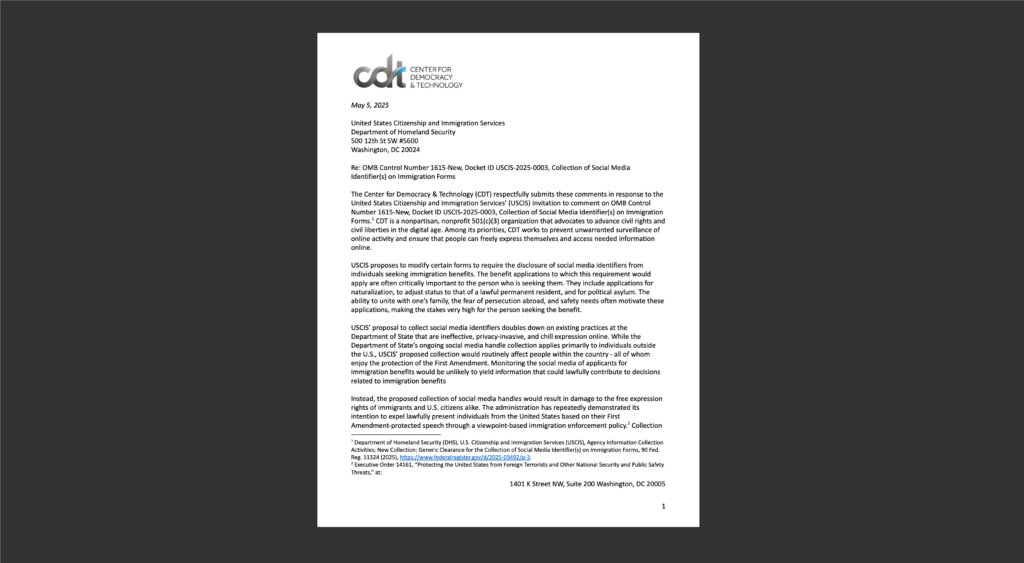European Policy, Free Expression
EU Tech Policy Brief: May 2025
Welcome back to the Centre for Democracy & Technology Europe‘s Tech Policy Brief! This edition covers the most pressing technology and internet policy issues under debate in Europe and gives CDT’s perspective on the impact to digital rights. To sign up for CDT Europe’s AI newsletter, please visit our website. Do not hesitate to contact our team in Brussels.
👁️ Security, Surveillance & Human Rights
Building Global Spyware Standards with the Pall Mall Process
As international attention focuses on misuses of commercial spyware, the Pall Mall Process continues to gather momentum. This joint initiative, led by France and the United Kingdom, seeks to establish international guiding principles for the development, sale, and use of commercial cyber intrusion capabilities (CCICs).
At the Process’s second conference in Paris earlier this month, Programme Director Silvia Lorenzo Perez joined global stakeholders as the process concluded with the adoption of a Pall Mall Code of Practice for States. The Code has been endorsed by 25 countries to date, including 18 EU Member States. It sets out commitments for state action regarding the development, facilitation, acquisition, and deployment of CCICs. It also outlines good practices and regulatory recommendations to promote responsible state conduct in the use of CCICs.

CDT Europe will soon publish a comprehensive assessment of the official document to provide deeper insights into its implications. In parallel, and as part of our ongoing work to advance spyware regulation within the EU, CDT Europe is leading preparation of the sixth edition of the civil society roundtable series, “Lifting the Veil – Advancing Spyware Regulation in the EU,” on 13 May. Stakeholders will discuss what meaningful action should look like in the EU, following the political commitments made by the Member States that endorsed the Pall Mall Code of Practice.
CSOs Urge Swedish Parliament to Reject Legislation Undermining Encryption
CDT Europe joined a coalition of civil society organisations, including members of the Global Encryption Coalition, in an open letter urging the Swedish Parliament to reject proposed legislation that would weaken encryption. This legislation, if enacted, would greatly undermine the security and privacy of Swedish citizens, companies, and institutions. Despite its intention to combat serious crime, the legislation’s dangerous approach would instead create vulnerabilities that criminals and other malicious actors could readily exploit. Compromising encryption would leave Sweden’s citizens and institutions less safe than before. The proposed legislation would particularly harm those who rely on encryption the most, including journalists, activists, survivors of domestic violence, and marginalised communities. Human rights organisations have consistently highlighted encryption’s critical role in safeguarding privacy and free expression. Additionally, weakening encryption would also pose a national security threat, as even the Swedish Armed Forces rely on encrypted tools like Signal for secure communication.
Recommended read: Ofcom, Global Titles and Mobile Network Security, Measures to Address Misuse of Global Titles
💬 Online Expression & Civic Space
DSA Civil Society Coordination Group Meets with the ODS Bodies Network
Earlier this month, the DSA Civil Society Coordination Group met with the Out-of-Court Dispute Settlement (ODS) Bodies Network for the first time to explore ways to collaborate. Under Article 21 of the Digital Services Act (DSA), ODS Bodies are to provide independent resolution of disputes between users and online platforms. As these bodies start forming and seeking certification, their role in helping users access redress and offering insights into platform compliance is becoming more important.
The meeting introduced the ODS Network’s mission: to encourage cooperation among certified bodies, promote best practices for data-sharing, and engage with platforms and regulators. Civil society organisations, which often support users who have faced harms on platforms, discussed how they could help identify cases that could be referred to ODS Bodies. In return, records from ODS Bodies could become a valuable resource for tracking systemic risks and holding platforms accountable under the DSA.
The discussion further focused on how to raise user awareness of redress options, make ODS procedures more accessible, and strengthen data reporting practices. Participants also outlined next steps for working more closely together, particularly around identifying the types of data that could best support civil society’s efforts to monitor risks and support enforcement actions by the European Commission.
Asha Allen Joins Euphoria Podcast to Discuss Civil Society in the EU
Civil society is under pressure, and now more than ever, solidarity and resilience are vital. These are the resounding conclusions of the latest episode of the podcast Euphoria, featuring CDT Europe’s Secretary General Asha Allen. Asha joined Arianna and Federico from EU&U to unpack the current state of human rights and the growing threats faced by civil society in Europe and beyond. With key EU legislation like the AI Act and Digital Services Act becoming increasingly politicised, they explored how to defend democracy, safeguard fundamental rights, and shape a digital future that truly serves its citizens. Listen now to discover how cross-movement collaboration and rights-based tech policy can help counter rising authoritarianism.

Recommended read: FEPs, Silenced, censored, resisting: feminist struggles in the digital age
⚖️ Equity and Data
EU AI Act Explainer — AI at Work
In the fourth part of our series on the AI Act and its implications for human rights, we examine the deployment of AI systems in the workplace and the AI Act’s specific obligations aimed at ensuring the protection of workers. In particular, we assess which of the prohibited AI practices could become relevant for the workplace and where potential loopholes and gaps lie. We also focus on the obligations of providers and deployers of high-risk AI systems, which could increase protection of workers from harms caused by automated monitoring and decision-making systems. Finally, we examine to what extent the remedies and enforcement mechanisms foreseen by the AI Act can be a useful tool for workers and their representatives to claim their rights. Overall, we find that the AI Act’s approach to allow more favourable legislation in the employment sector to apply is a positive step. Nevertheless, the regulation itself has only limited potential to protect workers’ rights.
CSOs Express Concern with Withdrawal of AI Liability Directive
CDT Europe joined a coalition of civil society organisations in sending an open letter to European Commission Executive Vice-President Virkkunen and Commissioner McGrath, expressing deep concern over the Commission’s recent decision to withdraw the proposed Artificial Intelligence Liability Directive (AILD) and stressing the urgent need to immediately begin preparatory work on a new, robust liability framework. We argued that the proposal is necessary because individuals seeking compensation for AI-induced harm will need to prove that damage was caused by a faulty AI system, which would be an insurmountable burden without a liability framework.
Programme Director Laura Lazaro Cabrera also participated in a working lunch hosted by The Nine to discuss the latest trends and developments in AI policy following the Paris AI Summit. Among other aspects, Laura tackled the deregulatory approach taken by the European Commission, the importance of countering industry narratives, and the fundamental rights concerns underlying some of the key features of the AI Act.

Recommended read: Tech Policy Press, Human Rights are Universal, Not Optional: Don’t Undermine the EU AI Act with a Faulty Code of Practice
🆕 New Team Member!

CDT Europe’s team keeps growing! At the beginning of April, we welcomed Marcel Mir Teijeiro as the Equity and Data programme’s New AI Policy Fellow. He’ll work on the implementation of the AI Act and CDT Europe’s advocacy to protect the right to effective remedy for AI-induced harms. Previously, Marcel participated in the Code of Practice multistakeholder process for General-Purpose AI Models, advising rights-holder groups across the cultural and creative industries on transparency and intellectual property aspects. A Spanish qualified lawyer, he also helped develop a hash-based technical solution for training dataset disclosure shared with the AI Office, U.S. National Institute for Standards and Technology, and the UK AI Safety Institute. We are excited to have him on board, and look forward to working with him!
🗞️ In the Press
- Euractiv, AI Act negotiators raise alarm over fundamental rights neglect in key implementation document
- Euractiv, Pall Mall Process: US to join European countries in pledge to curb ‘irresponsible’ use of spyware
- Agenda Digitale, Digital Services Act: What is it and what does the European law on digital services provide?
⏫ Upcoming Events
Tech Policy in 2025: Where Does Europe Stand?: On May 15, CDT Europe and Tech Policy Press are co-hosting an evening of drinks and informal discussion, “Tech Policy in 2025: Where Does Europe Stand?”. It will be an opportunity to connect with fellow tech policy enthusiasts, share ideas, and figure out what the future holds for tech regulation in Europe. The event is currently sold out, but you can still join the waitlist in case some spots open up!
Lifting the Veil – Advancing Spyware Regulation in the EU: CDT Europe, together with the Open Government Partnership, is hosting the sixth edition of the Civil Society Roundtable Series: “Lifting the Veil – Advancing Spyware Regulation in the EU.” The roundtable will gather representatives from EU Member States, EU institutions, and international bodies alongside civil society organisations, technologists, legal scholars, and human rights defenders for an in-depth exchange on the future of spyware regulation. The participation is invitation-only, so if you think you can contribute to the conversation, feel free to reach out at [email protected].
CPDP.ai 2025: From 21 to 23 May, CDT Europe will participate in CPDP.ai 18th International Conference. Each year, CPDP gathers academics, lawyers, practitioners, policymakers, industry, and civil society from all over the world in Brussels, offering them an arena to exchange ideas and discuss the latest emerging issues and trends. This year, CDT Europe will be hosting two workshops on AI and spyware, in addition to our Secretary General Asha Allen speaking on a panel on the intersection of the DSA and online gender-based violence. You can still register to attend the conference.


